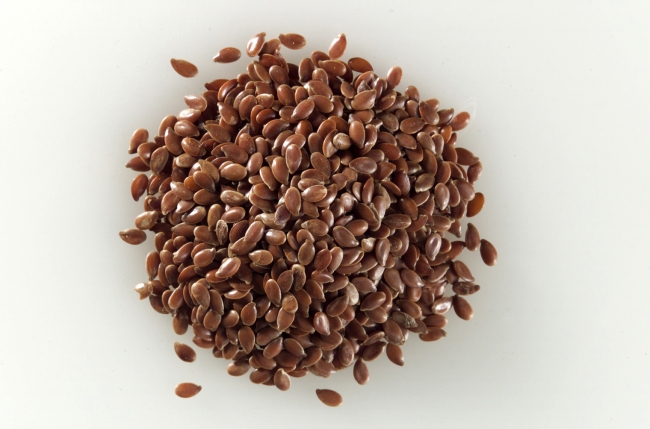Flaxseed has been considered as the one of the most powerful foods on earth. Flaxseed is a blue flowering plant, generally grown for the oil in its seeds. According to some evidence, flaxseed has been known to offer a number of health benefits including prevention of heart diseases, diabetes, stroke and boosting stamina. Flaxseed provides a number of benefits to adults and children alike, however it contains certain properties that are especially beneficial for children.

Nowadays, flaxseed can be found in various kinds of foods, from frozen waffles, to crackers to oatmeal. Flaxseed is used for feeding chickens that lay eggs having a greater content of omega-3 fatty acids. Even though flaxseed contains various healthy components, it has earned its reputation mainly because of three components:
1. Omega-3 fatty acids: This is the “good” fat that is essential for a healthy heart. One tablespoon of ground flaxseed contains 1.8 grams of omega-3 fatty acids.
2. Lignans: These contain plant estrogen as well as antioxidant properties. Flaxseed consists of 75-800 times more lignans than any other plant food.
3. Fiber: Flaxseed contains soluble as well as insoluble types of fiber.
Health benefits of flaxseed for children
There are many benefits of flaxseed for children including improved bone strength, prevention against heart diseases, cancer, diabetes and blood pressure regulation. Children that weigh between 70 and 105 pounds should consume about one-eighth cup of flaxseed every day. The most popular health benefits of flaxseed for children include protection from heart diseases, reduced susceptibility to respiratory diseases and colds, and improvement in digestive regularity.
1. Improved immunity
Flaxseed helps in boosting the immunity in children and granting them increased ability to fight infections and diseases. Moreover, flaxseed is known to stabilize blood sugar by stabilizing blood sugar levels. Flaxseed contains 27 different compounds that can help in the prevention of cancer according to the US Department of Agriculture.
2. Development of brain
Since flaxseed contains high quantities of omega-3 fatty acids that are required for brain development and proper communication among the nerve cells present inside the brain, it is recommended in a number of cases to pregnant or breastfeeding women. Omega-3 fatty acids present in flaxseed are also recognized for increasing the reading, learning and cognitive skills among developmentally uncoordinated kids.
3. Cardiovascular protection
Flaxseeds are high in fiber and omega-3 fatty acids that aid in the protection against heart problems and other chronic diseases. Experts suggest that adding flaxseeds to the diet of your children in order to balance omega-3 and omega-6 fatty acids because many researchers say that this imbalance may result in an increase in the rate of inflammatory disorders, such as cancers, arthritis and heart diseases.
4. Decreases susceptibility to cold
According to a study, it has been found that children who had less than one teaspoonful of flax oil every day had lesser respiratory infections than the children who were not supplemented with flax oil. It has been suggested that flaxseeds or flax oil should be taken in combination with vitamin E to boost your child’s immune system.
5. Improved digestive regularity
Fiber plays an important role in maintaining the regularity of the digestive system. Flaxseed contains insoluble fiber that can improve the digestive system regularity of your child. The fiber absorbs water, thereby helping the waste pass more easily through the colon preventing any discomfort or constipation. An important point to consider here is that while increasing the amount of fiber in your child’s diet you should also increase their water intake as well. If you have to face a difficult time convincing your child to drink more water, you can increase the quantity of fruits or vegetables in his diet. Another major benefit of flaxseed is that it consumption also reduces the symptoms for children suffering from Crohn’s disease and colitis. Omega-3 fatty acids are said ease the inflammation of intestines by healing their inner lining.
6. Decreases ADD (Attention Deficit Disorder)
Attention deficit disorder is a very common problem affecting many children. The omega-3 fatty acids present in flaxseed aids in reducing the ADD incidence thereby increasing the attention span and focus of school going kids. They are also known to calm the behavior of kids.
7. Helps in maintaining a positive mood
Omega-3 fatty acids are said to boost a positive mood and reduce feelings or depression or stress. Enhancing the nutrition to neurons also helps in improving the learning ability of children.
8. Better skin
Omega-3 fatty acids present in flaxseed helps in reducing skin problems and breakouts, revealing a better, clearer complexion and stronger nails. Many children who suffer from acne problem can make their skin better by using flaxseed.
9. Muscle and joint inflammation
Omega-3 fatty acids make up the raw materials required by the tissues to produce local hormones that are needed to regulate tissue and organ function. In addition to this, the hormones produced from omega-3 fatty acids are non-inflammatory as compared to those produced from omega-6 fatty acids. Therefore, athletic children will experience lesser inflammation after rigorous workout sessions.
Flaxseed and flax oil provide a number of health benefits to children. These wonder seeds should be made a part of the regular diet of your child so as to nourish them with the benefits of a balanced diet. Flaxseeds and flax oil are rich sources of protein and dietary fiber. Flaxseeds can be consumed by incorporating them in your diet in versatile forms, such as by sprinkling ground flaxseeds directly on salads and cereals, mixing it with a fruit smoothie or adding them to the dough for making cookies or muffins. It is particularly essential for children because it helps in proper brain function, growth and development.




